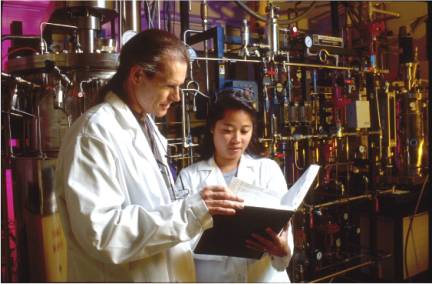|
|
Biology of Methanogenesis |
Department of Marine Biotechnology UMBC - Institute of Marine & Environmental Technology
Bioprocess scale-up of archaeal proteins
The
long-term goal of this project is the biochemical and physiological
characterization of newly identified enzymes and proteins essential for the
acetate fermentation pathway. Although
archaeal proteins have been successfully over-expressed in E. coli with high activity; many complex metalloenzymes such as the
five-subunit acetyl-CoA synthase complex have not met with success.
A number of factors can significantly influence the yield of
over-expressed foreign proteins in E. coli (inclusion body formation, proper folding and
compartmentalization, degradation and toxicity). Also, E. coli cells
lack the ability to conduct post-translational processing such as
glycosylation and methylation which may be necessary to produce active,
properly folded proteins. In
cases where proteins cannot be expressed in the heterologous E.
coli system, an autonomously replicating archaeal expression vector is
being developed to express target archaeal gene products in Methanosarcina
spp. for functional analyses.
Among the features being tested in the hybrid vectors are multiple
cloning sites, attenuatable archaeal promoters and C-terminal polyhistidine
sequence for purification using nickel chelating resin and detection with an
anti-His antibody. Target genes
are amplified and gene fragments generated with restriction endonuclease
for ligation into the multiple cloning site of the expression vector. The expression vector is then be transformed into
a selected species of
Methanosarcina
for scale-up
in a 20-200 liter culture volumes at the IMET pilot scale-up facility.
 Project Team
Project Team
Sheridan MacAuley
Ethel
Apolinario
Publications and Presentations
MacAuley, S.R., S.A. Zimmerman, E.E. Apolinario, C. Evilia, Y.-M. Hou, J.G. Ferry, K.R. Sowers. 2009. The Archetype g-Class Carbonic Anhydrase (Cam) Contains Iron when Synthesized in vivo in Methanosarcina acetivorans. Biochemistry 48(5): 817-9 [ABSTRACT].
K.R. Sowers. A third alternative for protein expression: the methanogenic Archaea. Annual Meeting of the Society for Industrial Microbiology, Denver, CO. July 29-Aug 2, 2007.
S.R.
MacAuley*, M. Harmon, Y.-M. Hou and K.R. Sowers.
A
system for overexpression of recombinant protein in Methanosarcina
acetivorans.
5th
International
Conference on Extremophiles.
September
19 - 23, 2004. Cambridge,
MD.
Related
Publications and Presentations
Sowers,
K.R. and H.J. Schreier. 1999.
Gene transfer systems for the Archaea.
Trends Microbiol. 7: 212-219.
Metcalf,
W.W. , J.K. Zhang, E. Apolinario, K.R. Sowers, and R.S. Wolfe.
1997. An archaeal gene
transfer system for Methanosarcina spp.:
liposome-mediated transformation and construction of shuttle vectors.
Proc. Nat. Acad. Sci. USA 94: 2626-2631.
Sowers,
K.R. and R.P. Gunsalus.
1988. Plasmid DNA from the
acetotrophic methanogen Methanosarcina acetivorans. J.
Bacteriol. 170: 4979-4982.
Sowers, K.R., M.J.
Nelson and J.G. Ferry. 1984.
Growth of acetotrophic methane producing bacteria in a pH auxostat.
Curr Microbiol.
11: 227‑230.
Funded by

